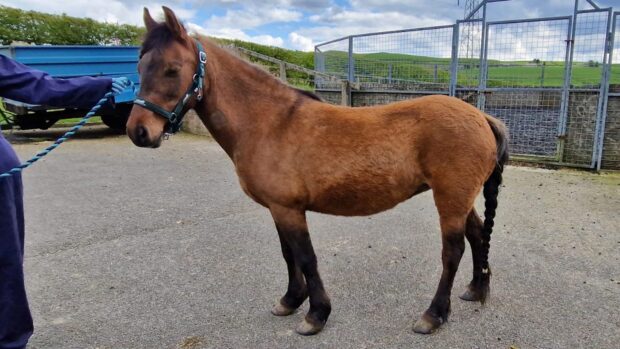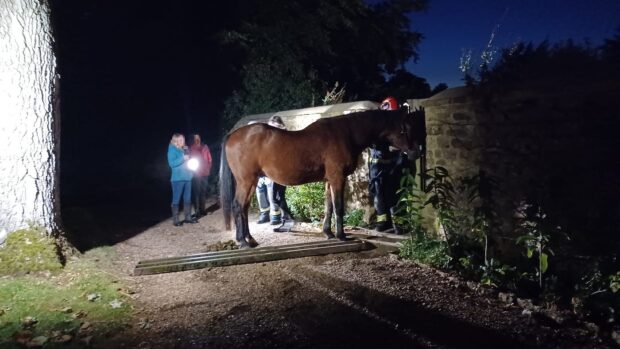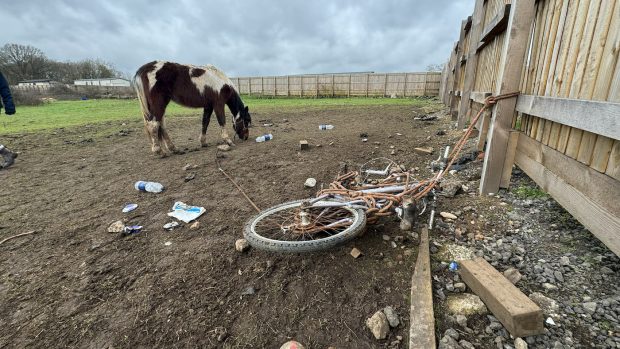Horse Trust director Paul Jepson told the Amersham trial last week that “painfully thin” horses, donkeys and ponies, removed from James Gray’s farm in January last year, made a “spectacular” recovery in the charity’s care.
Mr Jepson, who is also a vet, told the trial at Bicester Magistrates Court on Friday (23 January) that one of the 14 animals taken into the Horse Trust’s care increased its body weight by 72 per cent in three months.
The court heard that 14 animals — deemed to be those in the poorest state — were removed from Spindle Farm, in Chalk Lane, Hyde Heath, by RSPCA inspectors on January 4 and 5 last year, and taken to the Horse Trust at Speen.
A further 111 were seized the following week.
All 14 horses were given a body condition score of either one or two out of five.
Robert Seabrook QC, prosecuting, asked Mr Jepson to describe his observations on how the animals’ condition progressed.
Mr Jepson said: “The turnaround in most cases was pretty spectacular.”
Mr Seabrook asked if this was due to any medical treatment but Mr Jepson replied the animals did not receive “any hi-tech treatment”.
He said: “They just had the basic care you would expect to give to animals. Their needs were attended to. They were provided with shelter, deep, cleaning bedding, space, food and water.”
He added that the animals were wormed twice in the first month of their arrival.
Mr Jepson was asked for his opinion on how the animals had got into the state they were when they arrived at the Horse Trust.
Several showed signs of “parasitism”, with some blood tests indicating traces of salmonella.
One horse showed signs of the “extremely infectious” equine disease, strangles. Mr Jepson told the court it should have been isolated from other animals.
The animals showed “significantly low” levels of an enzyme called albumin in their bloodstream.
Mr Jepson said: “That will happen if you have intestinal damage through, for example, starvation, or if you are not producing it in the liver in sufficient quantities. When you get reduced production, it can be an indication of starvation.”
One horse increased its body weight by 50 per cent, from 230kg to 345kg, between January and April while in the care of the Horse Trust. Another put on 132kg within three months, and others put on 112kg and 99kg.
Mike Fullerton, for the defence, asked Mr Jepson if he was aware a number of animals at Spindle Farm had a good body condition. He replied he was not.
Mr Fullerton said a body conditioning score of two was in the ‘acceptable’ range, according to guidelines. Mr Jepson said it was, but added the body conditions of the animals he examined were still “a bit low”.
Mr Fullerton suggested some horse keepers deliberately keep animals suffering from strangles in with other horses as a way of inoculating the others. Mr Jepson agreed.
One of the seized horses was put down earlier this month due to a severe worm problem it had not been able to overcome.
Mr Jepson said it had been wormed five times since being taken into the care of the Horse Trust.
Five defendants, James Gray, 44, Julie Gray, 41, and Cordelia Gray, 20, all of Spindle Farm, Jodie Gray, 26, of Park Road, Ashford, Middlesex, and a teenager who cannot be named for legal reasons, each deny 12 charges under the Animal Welfare Act.
The trial continues.




